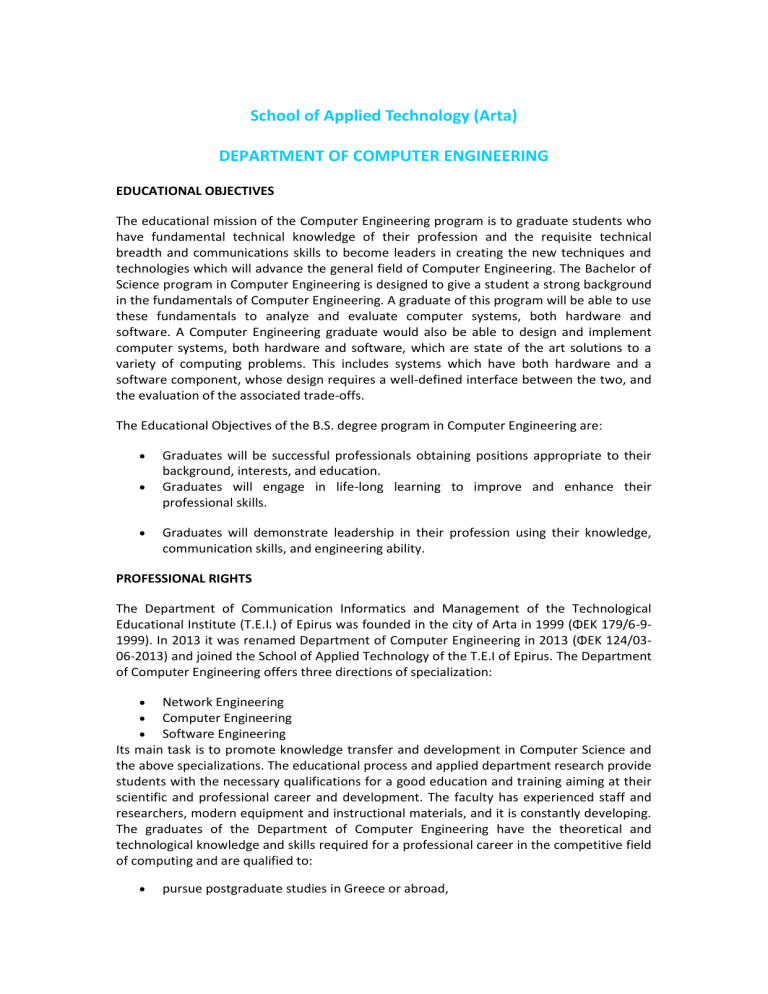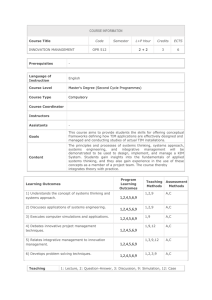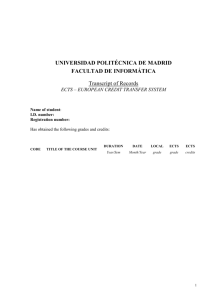school_of_applied_te..

School of Applied Technology (Arta)
DEPARTMENT OF COMPUTER ENGINEERING
EDUCATIONAL OBJECTIVES
The educational mission of the Computer Engineering program is to graduate students who have fundamental technical knowledge of their profession and the requisite technical breadth and communications skills to become leaders in creating the new techniques and technologies which will advance the general field of Computer Engineering. The Bachelor of
Science program in Computer Engineering is designed to give a student a strong background in the fundamentals of Computer Engineering. A graduate of this program will be able to use these fundamentals to analyze and evaluate computer systems, both hardware and software. A Computer Engineering graduate would also be able to design and implement computer systems, both hardware and software, which are state of the art solutions to a variety of computing problems. This includes systems which have both hardware and a software component, whose design requires a well-defined interface between the two, and the evaluation of the associated trade-offs.
The Educational Objectives of the B.S. degree program in Computer Engineering are:
Graduates will be successful professionals obtaining positions appropriate to their background, interests, and education.
Graduates will engage in life-long learning to improve and enhance their professional skills.
Graduates will demonstrate leadership in their profession using their knowledge, communication skills, and engineering ability.
PROFESSIONAL RIGHTS
The Department of Communication Informatics and Management of the Technological
Educational Institute (T.E.I.) of Epirus was founded in the city of Arta in 1999 (ΦΕΚ 179/6-9-
1999). In 2013 it was renamed Department of Computer Engineering in 2013 (ΦΕΚ 124/03-
06-2013) and joined the School of Applied Technology of the T.E.I of Epirus. The Department of Computer Engineering offers three directions of specialization:
Network Engineering
Computer Engineering
Software Engineering
Its main task is to promote knowledge transfer and development in Computer Science and the above specializations. The educational process and applied department research provide students with the necessary qualifications for a good education and training aiming at their scientific and professional career and development. Τhe faculty has experienced staff and researchers, modern equipment and instructional materials, and it is constantly developing.
The graduates of the Department of Computer Engineering have the theoretical and technological knowledge and skills required for a professional career in the competitive field of computing and are qualified to:
pursue postgraduate studies in Greece or abroad,
follow the rapid theoretical and technological advances in their field of study, based
on their background education, to work within their field of study either as freelancers or as employees and executives in public and / or private companies and organisations.
In particular, Computer Engineering graduates work as:
Software or hardware Engineers in public or private office automation services and / or in companies producing and marketing software or hardware applications.
Systems Designers, Analysts and Administrators in Network and Telecommunication
Services.
COURSE GUIDE
Students are expected to obtain their degrees in eight semesters; seven semesters for fulltime class instruction and for laboratory work. During the final semester, students are working on their dissertation supervised by one member of our academic staff whereas at the same time they are doing their practical training. A detailed description of the courses taught per semester has as follows:
UNDERGRADUATE COURSES
C O M P U L S O R Y C O U R S E S
1 S T S E M E S T E R
101.
MATHEMATICS FOR ENGINEERS
6 ECTS
102.
PROGRAMMING I
7 ECTS
103.
INTRODUCTION TO COMPUTER SCIENCE
6 ECTS
104.
LOGIC DESIGN
5 ECTS
105.
ANALOG ELECTRONICS
6 ECTS
2 N D S E M E S T E R
201.
DISCRETE MATHEMATICS
5 ECTS
202.
DIGITAL ELECTRONICS
6 ECTS
203.
TELECOMMUNICATIONS PRINCIPLES
6 ECTS
204.
COMPUTER PROGRAMMING & APPLICATION DEVELOPMENT
5 ECTS
205.
BUSINESS ADMINISTRATION & MANAGEMENT
4 ECTS
206.
PROBABILITY THEORY & STATISTICS
4 ECTS
3 R D S E M E S T E R
301.
COMPUTER ARCHITECTURE
6 ECTS
302.
DATABASES I
6 ECTS
303.
WIRELESS COMMUNICATIONS & NETWORKS
4 ECTS
304.
INTERNET COMMUNICATIONS PROTOCOLS
4 ECTS
305.
DATA STRUCTURES & ALGORITHMS
6 ECTS
306.
SIGNALS & SYSTEMS
4 ECTS
4 T H S E M E S T E R
401.
DATABASES II
3 ECTS
402.
OPERATING SYSTEMS
6 ECTS
403.
SEMINAR IN TECHNICAL WRITING
3 ECTS
404.
ARTIFICIAL INTELLIGENCE
4 ECTS
405.
LAN & MAN NETWORKS
4 ECTS
406.
OBJECT ORIENTED PROGRAMMING
6 ECTS
5 T H S E M E S T E R
501.
NETWORK MANAGEMENT
5 ECTS
502.
INTERNET PROGRAMMING
5 ECTS
503.
MULTIMEDIA TECHNOLOGY
5 ECTS
504.
DIGITAL COMMUNICATIONS
6 ECTS
505.
TELECOMMUNICATION NETWORKS I
5 ECTS
506.
PRINCIPLES OF PROGRAMMING LANGUAGES & COMPILERS
4 ECTS
6 T H S E M E S T E R - N E T W O R K E N G I N E E R I N G D I R E C T I O N
601.
602.
HIGH SPEED NETWORKS AND INTERNET WORKING
5 ECTS
DIGITAL SIGNAL PROCESSING
6 ECTS
603.
OPTICAL AND SATELLITE COMMUNICATIONS
5 ECTS
604.
TELECOMMUNICATIONS SYSTEMS
6 ECTS
ELECTIVE COURSE I
4 ECTS
ELECTIVE COURSE II
4 ECTS
6 T H S E M E S T E R - C O M P U T E R E N G I N E E R I N G D I R E C T I O N
605.
606.
MICROPROCESSOR SYSTEMS
6 ECTS
MULTIMEDIA PROCESSING
5 ECTS
607.
VLSI CIRCUIT DESIGN
6 ECTS
608.
PARALLEL AND DISTRIBUTED SYSTEMS
5 ECTS
ELECTIVE COURSE I
4 ECTS
ELECTIVE COURSE II
4 ECTS
6 T H S E M E S T E R - S O F T W A R E E N G I N E E R I N G D I R E C T I O N
609.
SOFTWARE ENGINEERING
6 ECTS
610.
COMPUTER GRAPHICS
6 ECTS
611.
MANAGEMENT INFORMATION SYSTEMS
5 ECTS
612.
VISUAL PROGRAMMING
5 ECTS
ELECTIVE COURSE I
4 ECTS
ELECTIVE COURSE II
4 ECTS
7 T H S E M E S T E R - N E T W O R K E N G I N E E R I N G D I R E C T I O N
701.
ADVANCE TOPICS ON NETWORK PROGRAMMING
5 ECTS
702.
TELECOMMUNICATION NETWOKRS
5 ECTS
703.
REAL-TIME DIGITAL SIGNAL PROCESSING SYSTEMS
6 ECTS
ELECTIVE COURSE I
7 ECTS
ELECTIVE COURSE II
7 ECTS
7 T H S E M E S T E R - C O M P U T E R E N G I N E E R I N G D I R E C T I O N
704.
EMBEDDED SYSTEMS
5 ECTS
705.
BIOMEDICAL ENGINEERING
5 ECTS
706.
ASIC DESIGN
6 ECTS
ELECTIVE COURSE I
7 ECTS
ELECTIVE COURSE II
7 ECTS
7 T H S E M E S T E R - S O F T W A R E E N G I N E E R I N G D I R E C T I O N
707.
DESIGN OF INFORMATION SYSTEMS
6 ECTS
708.
WEB APPLICATIONS TECHNOLOGIES
5 ECTS
709.
COMPUTATIONAL INTELLIGENCE
5 ECTS
710.
ELECTIVE COURSE I
7 ECTS
711.
ELECTIVE COURSE II
7 ECTS
8 T H S E M E S T E R
801.
UNDERGRADUATE DISSERTATION
………...20 ECTS
802.
PRACTICAL TRAINING
10 ECTS
ELECTIVE COURSES
6 T H S E M E S T E R - N E T W O R K E N G I N E E R I N G D I R E C T I O N
620.
TELE-EDUCATION SYSTEMS
4 ECTS
621.
ANALYSIS & DESIGN OF TELECOMMUNICATION CIRCUITS
4 ECTS
622.
ANTENNA THEORY: ANALYSIS AND DESIGN
4 ECTS
623.
PROTOCOL DESIGN
4 ECTS
624.
TELEMATIC APPLICATIONS
4 ECTS
6 T H S E M E S T E R - C O M P U T E R E N G I N E E R I N G D I R E C T I O N
625.
MICROELECTRONICS CIRCUITS
4 ECTS
626.
HARDWARE DESCRIPTION LANGUAGES
4 ECTS
627.
HUMAN-COMPUTER INTERACTION
4 ECTS
628.
EXPERT SYSTEMS
4 ECTS
629.
IMAGE AND VIDEO PROCESSING
4 ECTS
6 T H S E M E S T E R - S O F T W A R E E N G I N E E R I N G D I R E C T I O N
630.
E-COMMERCE
4 ECTS
631.
BIOINFORMATICS
4 ECTS
632.
COMPUTER SYSTEMS SECURITY
ECTS
633.
THEORY OF COMPUTATIONAL
4 ECTS
634.
MULTIMEDIA APPLICATION DEVELOPMENT
4 ECTS
6 T H S E M E S T E R
635.
INNOVATION & ENTREPRENEURSHIP
4 ECTS
636.
HUMAN RESOURCE MANAGEMENT
4 ECTS
7 T H S E M E S T E R - N E T W O R K E N G I N E E R I N G D I R E C T I O N
720.
ADVANCED INTERTWORKING SERVICES
7 ECTS
4
721.
ADVANCED DIGITAL LOGIC DESIGN USING VHDL
7 ECTS
722.
MICROWAVE CIRCUITS
7 ECTS
723.
SIMULATION MODELING & ANALYSIS
7 ECTS
724.
FIBER OPTICS COMMUNICATION NETWORKS
7 ECTS
725.
MOBILE DEVICE PROGRAMMING
7 ECTS
7 T H S E M E S T E R - C O M P U T E R E N G I N E E R I N G D I R E C T I O N
726.
DESIGN OF ANALOG INTEGRATED CIRCUITS & SYSTEMS
7 ECTS
727.
ROBOTICS
7 ECTS
728.
SYSTEM DESIGN LANGUAGES
7 ECTS
729.
SENSOR NETWORKS
7 ECTS
730.
SPECIAL TOPICS IN COMPUTER ARCHITECTURE & MICROPROCESSORS
7 ECTS
731.
SIMULATION MODELING & ANALYSIS
7 ECTS
7 T H S E M E S T E R - S O F T W A R E E N G I N E E R I N G D I R E C T I O N
732.
DATA MINING
7 ECTS
733.
SPECIAL TOPICS IN DATABASE SYSTEMS
ECTS
734.
ADMINISTRATION & CONTROL SYSTEMS
7 ECTS
735.
DECISION SUPPORT SYSTEM
7 ECTS
736.
BUSINESS INTELLIGENCE
7 ECTS
7
737.
PATTERN RECOGNITION
ECTS
RESOURCES
EDUCATIONAL, TECHNICAL & ADMINISTRATIVE STAFF
7
The Department of Computer Engineering has thirteen (13) members of tenured educational staff and two (2) members of specialized technical staff:
Name
Evripidis Glavas
Nikolaos Antoniadis
Constantinos Angelis
Chrysostomos Stylios
Marios Mantakas
Grigoris Doumenis
Eleftherios Stergiou
Ioannis Tsoulos
Alexandros Tzallas
Fotis Vartziotis
Dimitrios Lariokapis
Stavros Adam
Amalia Gavriil
Spyridoula Margariti
Vasileios Charilogis
Position
Professor
Professor
Professor
Associate Professor
Assistant Professor
Assistant Professor
Assistant Professor
Assistant Professor
Professor of Practice
Professor of Practice
Professor of Practice
Professor of Practice
Professor of Practice
Specialized Technical Staff
Specialized Technical Staff
The Department of Computer Engineering also three (3) members of administrative staff:
Name
Evaggelia Christou
Vasileios Zarzanis
Eleni Nakou
Position
Head of Secretariat
Secretarial Staff
Secretarial Staff
INFRASTRUCTURE
The premises of the Department of Computer Engineering are located in the campus of
Kostakioi, a location about five kilometers from the center of Arta. Its modern building facilities are tailored for the research and teaching needs of the department as they comprise:
Three (3) auditoriums which have at their disposal the requisite equipment such as projectors, sound systems, wireless networking in order to conduct the lectures. The central auditorium is used for the organization of workshops, seminars and conferences.
Fourteen (14) educational Computers labs are used for the laboratorial education of students but they also satisfy the wider educational needs and support the administrative function of the department. The laboratories are linked to the central library of T.E.I. of Epirus. They offer to the students’ access to internet and to specialized software and databases.
A meeting room with advanced equipment for the general meetings of the
Department.
PARTNERSHIPS/ PROGRAMS/AWARDS
PARTNERSHIPS
The Department of Computer Engineering collaborates in a regular basis with other
Departments of higher education institutions both domestic and abroad, mainly for research projects. Specifically, the Department has worked among others with the University of
Ioannina, the University of Patras, the T.E.I. of Patras, the T.E.I. of Kavalas, the University of
Western Macedonia, The Computer Technology Institute and Press “Diophantus”, the
University of Duke, the Emory University, Atlanta, Georgia USA, the Georgia Institute of
Technology, Atlanta, Georgia, USA, the University of Alberta, Canada, the Polytechnic
University of Bari, the University of Lecce, the University of Trieste, the Ufa State Aviation
Technical University (USATU) – Russia, the Technical University of Prague, Czech, the MSTU
'STANKIN' (Russia), the UCL Medical School (Department of Histopathology) etc. Faculty members of the Department also collaborate with faculty members of many other
Universities producing scientific results that are published in Greek and International journals and conferences.
PROGRAMS
The Department has successfully completed several research & development projects undertaken in the past such as: «INNOVA – Actions for the Transfer of
Innovation in Common Strategic Sectors, ΙNTERREG IIIA GREECE-ITALY 2000-2006»,
«INNOVA NET - International centre of competences for Innovation in the
Mediterranean countries, INTERREG IV Greece - Italy, Cross-Border Cooperation
Programme 2007-2013», «Education and Lifelong Learning, NSRF 2007 –
2013»,«CaseMaker: Innovative ICT-platform to enhance case-based teaching and learning, LIFELONG LEARNING PROGRAMME (LLP-FP7)», «TEN ECOPORT -
Transnational ENhancement of ECOPORT8 network”, SOUTH EAST EUROPE
Transnational Cooperation Programme», «Intelligent System for Automatic
AWARDS
CardioTocoGrafic Data Analysis and Evaluation using State of the Art Computational
Intelligence Techniques, Operational Programme Competitiveness and
Entrepreneurship Bilateral R&D Cooperation Greece-Czech Republic (2011-2013)»,
«SAIL, ICT System Addressed to Integrated Logistic management and decision support for intermodal port and dry port facilities, Seventh Framework Programme
(FP7) »
At the site "ARISTEIA" ( http://excellence.minedu.gov.gr/listing/720-tzallas ), which stands for excellence, of the Greek Ministry of Education there is an action in which Department participation is demonstrated. This action refers to the first prize of "the Most Innovative
Solution" and the prize of "the Best Use of Resource" in the MIT Media Lab competition
“Health and Wellness Innovation 2013”.
METHODS OF COMMUNICATION
EDUCATIONAL STAFF
Name Position
Evripidis Glavas Professor
Nikolaos Antoniadis Professor
Constantinos Angelis Professor
Chrysostomos Stylios Associate Professor
Marios Mantakas
Grigoris Doumenis
Assistant Professor
Assistant Professor
Eleftherios Stergiou Assistant Professor
Ioannis Tsoulos Assistant Professor
Alexandros Tzallas
Fotis Vartziotis
Professor of Practice
Professor of Practice
Dimitrios Lariokapis Professor of Practice
Stavros Adam Professor of Practice
Amalia Gavriil Professor of Practice
TECHNICAL STAFF
Phone
26810 50344
26810 50345
26810 50351
26810 50330
26810 50332
26810 50337
26810 50346
26810 50344
26810 50344
26810 50448
26810 50323
26810 50331
26810 50337 e-mail eglavas@teiep.gr nadon@teiep.gr kangelis@teiep.gr stylios@teiep.gr mmantak@teiep.gr greg@teiep.gr ster@teiep.gr itsoulos@teiep.gr tzallas@teiep.gr fvartzi@gmail.com dili@teiep.gr adamsp@teiep.gr agavriil@teiep.gr
Name
Spyridoula Margariti
Vasileios Charilogis
Position
Specialized Technical
Staff
Specialized Technical
Staff
Phone
26810 50507
26810 50508 e-mail smargar@teiep.gr harilog@teiep.gr
ADMINISTRATIVE STAFF
Name
Evaggelia Christou
Vasileios Zarzanis
Eleni Nakou
Position
Head of Secretariat
Secretarial Staff
Secretarial Staff
26810 50499
26810 50341
26810 50350 e-mail echristou@teleinfom.teiep.gr zarzanis@teiep.gr enakou@teleinfom.teiep.gr
EDUCATIONAL STAFF CVs
Dr. Evripidis Glavas graduated from University of Ioannina, Greece in 1983 with a
Diploma in Physics. He continued his studies in UK, where he received a Ph.D. degree from University of Sussex in1988. He had extensive experience in basic and applied research, in producing innovative products as well as in industrial standards certification. He has worked as a Research Associate and Research Fellow at English
Universities (University of Sussex and University of Liverpool) and Greek Universities in several research projects. His research work has been published in book chapters, journals papers and conference proceedings. From 2008 he holds a position of
Professor in the Department of Informatics and Communications, in Technological
Educational Institute (T.E.I.) of Epirus. From 2001 to 2002 and from 2003 to 2005 he was assigned the position of the Head of the Department of Computer Engineering in T.E.I. of Epirus. From 2005 to 2012, he was served as the Vice president of T.E.I of
Epirus with major responsibilities of managing the Economic Planning and
Development of the T.E.I. of Epirus. From 2013 he holds the position of the
President of the T.E.I. Epirus.
Dr. Constantinos T. Angelis was born in Arta, Greece, on May 15, 1968. He graduated in Physics from the Physics Department in the University of Ioannina,
Greece in 1992, and he received his M.Sc. and Ph.D. degrees in solid-state electronics from the University of Ioannina, Greece in 1996 and 2000, respectively.
Today is a full-time Professor at the Department of Computer Engineering,
Technological Educational Institute of EPIRUS and a fellow researcher at the
Electronics & Telecommunications Laboratory at the Physics Department of the
University of Ioannina, GREECE. His research interests are in the fields of Electrical
Characterization (AC, DC) of Microelectronic Devices, Reliability of Microelectronic
Devices, Electronic properties of semiconductor devices, Electric properties of thin film semiconductor silicon transistors, Effect of electric fatigue on the reliability of the above transistors, Electronic low frequency noise in semiconductor devices, RF
transistor design, Wireless transceiver design, Radio-frequency and high-frequency wireless system design, Software Radio Systems and Digital Signal Processing
Techniques, Adaptive (smart) antennas for wireless networks, array antenna beamforming and Signal Propagation. He has over 25 scientific publications in the above areas and he is recognized by more than 45 citations in the citation index. He has participated in several EU funded projects and various national projects. C.T.
Angelis is a member of the IEEE.
Dr. Chrysostomos Stylios holds since 2013 the position of Associate Professor, he joined the department as Assistant Professor at 2006, and since then he is in charge of the Laboratory of Knowledge & Intelligent Computer at the Department of
Computer Engineering of the Technological Educational Institute of Epirus, Arta,
Greece. He is also Research Collaborator and Project Manager at the Computer
Technology Institute & Press “Diophantos”, Patras (2011-present). He received his
Diploma in Electrical & Computer Engineering from the Aristotle University of
Thessalonica, Greece (in 1992) and his PhD with honour in Electrical & Computer
Engineering from the University of Patras, Greece (in 1999). He served as
Postdoctoral Researcher-Research Fellow at the Laboratory of Automation &
Robotics of the Dept. of Electrical & Computer Engineering, University of Patras
(1999-2006), Visiting Assistant Professor at the Dept. of Computer Science,
University of Ioannina (2000-2004), Research & Development Consultant at Patras
Science Park S.A. (body supervised by GSRT) (2004-2011), Assistant Professor at the
Technological Educational Institute of Epirus, Arta, Greece (2006-2013), Visitor
Professor at the Faculty of Engineering of the University of Alberta, Canada (2014).
He has more than 15 years of experience as Local Coordinator and Project Manager of several research and development projects of a total budget of 4 million Euros.
His research interests include Soft computing techniques & Computational
Intelligence; Fuzzy Cognitive Maps, Fuzzy Logic, Neural Networks, Support Vector
Machines; Knowledge-based systems; Simulation and Modelling Complex Systems;
Intelligent Systems; Biosignal processing & analysis; Medical Decision Support
Systems; Hierarchical Systems & Supervisory Control; Intelligent Manufacturing
Systems. He has served as member of International Programme Committee of more than 25 international conferences, he is reviewer of scientific papers in numerous international Journals & Conferences and organiser of three (3) special sessions in international conferences. Dr. Stylios has published more than thirty five (35) articles in international journals, eight (8) chapters in scientific edited books, more than one hundred twenty (120) articles in international conferences and he is the editor of three (3) books and his research contribution has been received recognition and reference of more than 750 independent scientists. He is member of the IEEE and member of the following Technical Committees: “TC 8.2 ,TC 5.4 and TC20 of IFAC.
Dr. Marios Mantakas is an assistant professor. He teaches enterprise information systems and software engineering courses, and coordinates the Department's educational actions in entrepreneurship. His current research concerns the evaluation of enterprise information system implementation and use maturity in
SMEs, and is supported by an Archimedes III research grant of the Operational
Programme Education and Lifelong Learning, co-financed by Greece and the
European Union.
Dr. Gregory Doumenis is Assistant Professor at the Department of Computer
Engineering of the Technological Educational Institute of Epirus (Arta, Greece). He received his Diploma in Electronic Engineering from the Electrical Engineering
Department of NTUA, Greece (in 1990) and a PhD degree in Broadband
Communication Systems (in 1994) from the same institute. He is a seasoned manager with significant experience in high tech startups, having co-founded two companies. Dr. Doumenis was a founding member of the Hellenic Semiconductors
Industry Association (HSIA), now counting more than 100 member organizations, and served as VP of the HSIA (2007-2009) and at the BoD of the microelectronics cluster steering committee (2014-2015). He participated as researcher and later as project manager in several EU funded R&D projects with leading European companies (including ALCATEL, SIEMENS, INFINEON, ERICSSON), in the areas of telecom systems and networks. He has authored and co-authored more than 30 research papers published in widely accepted scientific magazines or international conferences and has applied for four patents. He has been invited to review papers for highly recognized journals such as IEEE’s Micro and communications letters and
Elsevier’s Integration VLSI journal. He is a regular reviewer and evaluator of EU backed RTD proposals and projects. His research interests include Internet of Things, signal processing, broadband networks, multimedia systems and applications, autonomous embedded systems and digital systems architectures.
Dr. Eleftherios Stergiou is Assistant Professor in the department of Computer
Engineering, at Epirus Institute of Technology in Greece since 2000. He is also a researcher at the University of Patras. He received the B.S. degree in electrical engineering from NTUA, Athens Greece, and he finished his postgraduate studies at the computer science department of the University of Sheffield. He received his PhD from Patras University in subject relevant to performance of computer networks, especially referred to performance of multistage interconnection networks. His research interests on performance evaluation of networks integrate by publishing papers in international journals and he has written a book relevant to LAN and MAN technology as well as some chapters referred on computer networks. Moreover it has processed some reviews in some articles of scientific journal relevant to computer networks. He has participated in some European and national IT and
Telematics Projects via his department Computer Engineering. Among these interests, computing analytical methods, performance of networks, interconnection networks, parallel and distributed systems, high-speed networks, are included. Dr. E.
Stergiou is member of IEEE Computer Society.
Dr. Ioannis G. Tsoulos received B.S. degree in Computer Science from the University of Ioannina, Ioannina, Greece (in 1998), M.Sc. from the same University in 2001 and
Ph.D. degree in Computer Science with title: Global Optimization, methods and software from the University of Ioannina, Ioannina, Greece (in 2006). He has worked on several research programs at Greek universities (University of Patras, University of Crete, University of Ioannina, National Technological and Educational Institute of
Epirus). Also, he has worked several years as a visiting lecturer in Universities and
Technological Educational Institutes. He has published almost 48 peer-reviewed manuscripts. He has received more than 250 cross-references. He serves as reviewer for several scientific journals and conferences. His research interests include global optimization, neural networks, genetic algorithms, genetic programming, biomedical signal and image processing. Also, he has worked as a freelancer in the area of mobile applications and he has published more than 60 applications for Symbian, i-
phone and Android mobile devices. He holds the position of Assistant Professor at the Department of Computer Engineering of Technological Educational Institute
(T.E.I.) of Epirus.
Dr. Alexandros Tzallas holds the position of Professor of Practice at the Department of Computer Engineering of the Technological Educational Institute of Epirus, Arta,
Greece. He holds a BSc degree in Physics from the University of Ioannina, Ioannina,
Greece (in 2001) and a PhD degree in Medical Physics from the University of
Ioannina, Ioannina, Greece (in 2009). He has worked on several research and development European and national programs as a software engineer, researcher, technical manager, seminar instructor and post-doc researcher. He has published more than 60 peer-reviewed manuscripts, 4 book chapters and he is the editor of 1 book. He has received more than 660 citations. He serves as reviewer for several scientific journals and conferences and he also serves as an Editorial Board member of Journal of Healthcare Informatics. His research interests include
Neurodegenerative Diseases, EEG, wearable devices, biomedical signal and image processing, biomedical engineering, decision support and medical expert systems and biomedical applications. His latest scientific work through the PERFORM project and AEON Health project, which strong related to ambulatory monitoring of motor functions in patients with Parkinson's disease (PD) using wearable sensors and devices, has been awarded with the pHEALTH innovation award (pHEALTH 2010,
Berlin, Germany), has been among the 21 finalists in the “GREEK INNOVATES” competition, and recently has awarded with the “Most Innovative Solution” and the
“Best Use of Resources” in the MIT Media Lab competition “Health and Wellness
Innovation 2013”.
Fotis Vartziotis received his Diploma in Electrical Engineering in 1998 from Aristotle
University of Thessaloniki (GR), the M.Sc. degree in Telematics (Communications and
Software) in 2000 from University of Surrey (UK) and MSc degree in Management of
Technical Projects in 2010 from Hellenic Open University (GR). Currently, he is pursuing a PhD in Computer Science at University of Ioannina. His main research interests include VLSItesting, Design for Testability, test-data compression architectures, power- and thermal- aware test methodologies. Since 2010, he is
Professor of Practice at the Computer Engineering Department, Technological
Educational Institute of Epirus, Greece. F. Vartziotis has participated in a considerable number of European and Greek research projects proposing, designing and developing advanced portable devices and software platforms. He is a member of the IEEE and the Technical Chamber of Greece.
Dr. Dimitrios Liarokapis received his PhD in Computer Science from the University of
Massachusetts Boston in December 2001. He holds an MS in Computer Science from the same institution and a BS in Computer Engineering and Informatics from the
University of Patras in Greece. Dimitrios has over than fifteen year experience working in the software industry mainly in the US as a senior software and database engineer. His latest appointments were at IBM, Sony PlayStation (SCEA) and Intuit.
During his PhD research he worked with Patrick O’Neil and Elizabeth O’Neil for a NSF project developing a tool (HISTEX) and a methodology to test the correctness and accuracy of Isolation Levels of Relational Database Management Systems implemented by commercial vendors. During his career as an engineer he has visited the Technological Institute of Greece located at his home town Arta to teach
Computer Science courses. He is currently serving there as a Professor of Practice.
Stavros P. Adam, received a Maîtrise d’Informatique (B.Sc. in Informatics) in 1985, a
D.E.S.S. en Informatique (M.Sc. in Informatics) in 1986 and a D.E.A. en Traitement
Graphique - Traitement d’Images (M.Sc. in Computer Graphics and Image
Processing) in 1987, all from the University Louis Pasteur of Strasbourg. He also holds a Diploma in Mathematics from the University of Athens. He worked for more than sixteen years as a computer systems specialist, designing, developing and commissioning computer based systems and applications for the automation and the defense industry (INTRACOM Defense Electronics). He was in charge of major industrial R&D projects in the area of simulation (simulation based optimization and military training simulators) and he was awarded the title of company expert in the field of simulation systems. He currently serves as a Lecturer at the Dept. of
Computer Engineering of the Technological Education Institute of Epirus. He is also a
Ph.D. candidate at the Dept. of Mathematics (joint program with the Dept. of
Computer Engineers) of the University of Patras under the supervision of Prof. M. N.
Vrahatis. His main research interests include reliable computing, neural networks and computational intelligence methods with application to modeling and simulation of complex systems. He has published six peer reviewed manuscripts.





